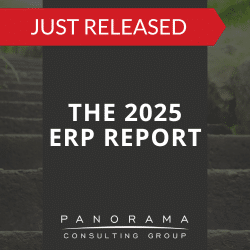While many firms claim to be “ERP consultants,” claiming is not the same as actually being a competent and seasoned ERP consultant, particularly in the public sector. What is a government CIO or G6 to do when an ERP system is required? How do they find a consultant who will streamline their processes, provide sage advice and deliver a successful go-live? Well, my friends, you are in luck. We have a handy five-step method to help guide your choice:
1. Recent experience. Ensure your prospective consulting team has significant and recent experience implementing ERP software, particularly in the public sector. If you are nonprofit, look for firms with a great deal of experience with nonprofits. If you are in the federal government, ask for the consultants to provide references with other federal government organizations of similar size and mission. Ask for references, check the references and ask the hard questions: How will they handle scope, changes, requirement creep, schedule and budget? A key indicator of experience is having multiple industry studies, white papers and case studies published by the consulting team.
2. Independence. Are the consultants truly independent or tied to a specific ERP system? While many competent consulting firms have ties to specific ERP vendors, consider selecting an independent consulting team that will help you select the right software for your organization. It is better to use the correct tool rather than using a hammer for every issue even if it requires a screw or a molly bolt.
3. Are they up to the challenge? Ask the consulting team to provide industry specific certifications and accreditations. Ensure those credentials belong to the consultants that will actually be doing the work. The consulting team should be PMP- and Six Sigma certified and actively involved in local or national chapters. Membership in ERP, PMI and Six Sigma organizations is a key indicator that the consulting team is continuously growing their skill set. The gold standard is SAP, Microsoft, Oracle and other vendor specific certifications. Make sure their certifications are up-to-date and that everyone on the consulting team has credentials.
4. Do a background search. If the team will be working with classified departments of government organizations, be sure to ask if it has the necessary clearances. If not, it is a time-consuming process to get an un-cleared individual the necessary clearances to complete a project and make it successful. Additionally, look at the history of the team – bankruptcies, misdemeanor convictions and other red flags must be checked prior to giving them access to your sensitive materials and information.
5. Project team. Nail down who specifically will be on the team and hold the consulting firm accountable to this. Are you investing in a single person or a team? “Bait and switch” is a common complaint with consulting firms. They bring in the high value and extremely experienced consultants to make the sale and attend the kick-off meetings; then two weeks later, the team is wholly composed of recent MBA graduates with less-than-robust ERP experience in your vertical. Prior government projects are a key predictor of success. ERP consultants who are experienced in your public sector vertical understand the difference between public sector pressures and regulations and the bottom-line driven private sector.
Panorama’s independent ERP consultants provide a full spectrum of support in software selection, change management and implementation for government agencies, departments and organizations. Our experienced ERP consultants are an insurance policy against project cost overruns, misaligned software, diminished return on investment and diminished return on citizenship (ROC). Our team has public sector experience in overseas, remote and difficult environments and will work with you to transform and innovate your organization and its processes.
Learn more by watching our on-demand webinar, Tips to Select the Best ERP Consultants.
Written by Rich Farrell, Senior Manager of Client Services at Panorama Consulting Solutions.












